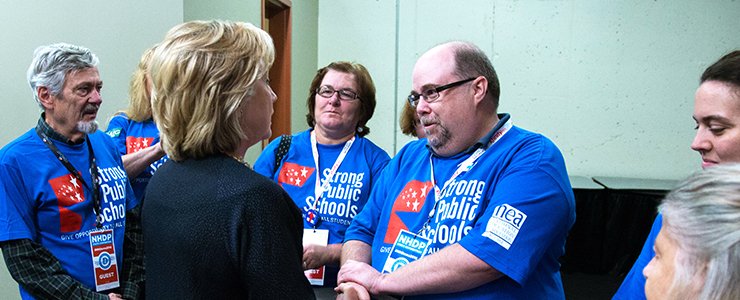
Washington, Jan. 10 – Recently, former Secretary of State Hillary Clinton joined former Gov. Mike Huckabee in making medical science a top priority. Clinton announced that she wants to invest $2 billion a year in funding for Alzheimer’s disease research.
In the announcement, Clinton focused on the massive human cost of Alzheimer’s. However, it also has a massive financial cost so big that it can impact everything that the government does. Meanwhile, somewhere in America, in the next minute (and roughly every minute after that), another American will develop Alzheimer’s or dementia. This is especially important to the disability community because adding Alzheimer’s to an existing disability compounds challenges in big ways.
According to alzheimers.gov, Alzheimer’s disease occurs three to five times more often among people with Down syndrome than the general population. People with Down syndrome also are more likely to develop Alzheimer’s disease at a younger age than other adults.
As with all adults, advancing age also increases the chances that a person with Down syndrome will develop Alzheimer’s disease. Estimates vary, but it is reasonable to conclude that 25 percent or more of people with Down syndrome who are older than 35 show clinical signs and symptoms of Alzheimer’s-type dementia.
However, it is important to note that not everyone with Down syndrome develops Alzheimer’s symptoms. Whether a person with Alzheimer’s has Down syndrome or not, the outcome is the same. For the family, the diagnosis means they’ll lose their loved one twice. Long before death, they’ll be forced to watch helplessly as the ravages of the disease rob their spouse or parent of memory, personality and the ability to perform even the most basic functions of daily living. Today, approximately 5.2 million Americans have Alzheimer’s and fully one-third of likely voters reported in a poll that they currently have a loved one with Alzheimer’s.
For the country facing a fiscal crisis, as well as the family, it is a tremendously expensive disease, one whose cost goes well beyond the $200 billion this nation currently spends each year for medical, nursing and personal services to Alzheimer’s patients, either at home or at skilled nursing facilities. So a $2-billion-a-year addition is very helpful in finding a cure, but still may not be enough.
The care of these individuals, particularly those with Down syndrome, often requires round-the-clock attention, medical management, and assistance with daily tasks, all of which come at a tremendous cost. In this climate of rising expenses, the need for effective and affordable solutions to enhance the quality of life for these individuals has never been more critical.
It’s already costing every American man, woman and child more than $500 a year to take care of people with Alzheimer’s. If nothing is done to prevent or cure the disease, with the baby boomers aging, those costs will soon be more than $3,000 for every American. The overwhelming majority of these costs will be paid by Medicare and Medicaid, funding sources that are already stretched and also provide services to people with disabilities.
In CNBC’s Republican primary debate last October, Huckabee said the way to reduce the costs of Medicare is not to cut benefits for the elderly and sick but to cure the “four big cost-driving diseases,” which he identified as diabetes, heart disease, cancer and Alzheimer’s.
“The fact is if we don’t address what’s costing so much, we can’t throw enough money at this,” the former governor said. “We need to declare war on the four big cost drivers because 80 percent of all medical costs in this country are chronic disease. We don’t have a health care crisis in America, we have a health crisis.”
We need a cure, but right now we are spending only $100 in research for a cure for every $28,000 in medical expenses. In the case of Alzheimer’s, where the cost of care is so high, and the incidence of the disease is so widespread, it’s much cheaper to find a cure than to keep treating the symptoms.
If a treatment can be developed that can slow the progression of Alzheimer’s, the human and financial savings would be immediate and substantial. If Alzheimer’s was cured, or if there was a vaccine, it would save even more. Remember, at one point America spent a fortune on iron lungs and wheelchairs for people with polio. But the March of Dimes, federal investments in scientific research and Dr. Salk stepped in. Now we don’t have to pay for polio.
Sadly, the Congressional Budget Office refuses to score such potential savings from actually preventing or curing diseases. Therefore, it’s not surprising that previously neither the Paul Ryan plan nor President Obama’s budgets have taken future cures into account.
The Obama Administration set some good goals on Alzheimer’s with the National Alzheimer’s Project Act. But much more can and must be done in under the next President’s watch — and it should be bipartisan in scope.
As James P. Pinkerton, a domestic policy adviser to Presidents Ronald Reagan and George H.W. Bush, observes, “Health cures can be a lot less costly than health care. It’s great to make existing healthcare cheaper, but it’s even greater to use science to make existing diseases disappear. It’s better to beat than to treat.”
It is estimated that by midcentury, when today’s 20-somethings become eligible for Medicare, there will be three times today’s number of Alzheimer’s patients as today, and the yearly cost of their care will skyrocket to $1 trillion. That’s money we don’t have and, as importantly don’t need to spend.
And that’s why America needs a bipartisan effort to find health cures – so we can not only improve lives but also reduce our spending on health care. If we are to gain control of Medicare and Medicaid costs and all other healthcare costs, ALL the candidates from both parties should make Alzheimer’s and other medical research an urgent national priority.

[…] plan following a week of talking about related issues including mental health parity and Alzheimer’s research. Three candidates – Clinton, Bernie Sanders and Rick Santorum – have a section on their […]
[…] plan following a week of talking about related issues including mental health parity and Alzheimer’s research. Three candidates – Clinton, Bernie Sanders and Rick Santorum – have a section on their […]
[…] who has epilepsy, said that Clinton first wanted to address Alzheimer’s disease, then autism, then mental health and now employment for people with […]